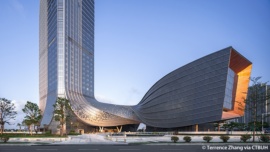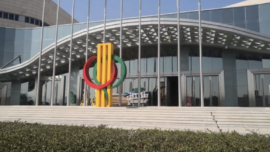The retail sector — particularly the luxury retail segment — is quickly coming back, banking on the gradual return of mainland travellers. However it is not yet on steady ground due to the uncertainties surrounding the pandemic
22.9%
– Increase in sales of leather goods in 1Q21 from 1Q19
Are travellers coming back? Do they still have the same spending power? These questions have been sown in the minds of local businesses as travel restrictions between Macau and Mainland China have been gradually lifted since mid-2020. Though the results of the latest test — the Labour Day holiday of the mainland — show it still takes time for the recovery of tourist tally and retail sales, the city is, at least, on the right track.
Figures from the Macau Government Tourism Office said the territory received 167,000 travellers during the May Day holiday, covering the period of 1-5 May, or 33,400 visitors a day, with a new daily record of over 45,000 visitors on 1 May, since the Covid-19 pandemic started in early 2020. The 2021 volume only translated to 21.2 per cent of the level recorded on the Labour Day holiday in 2019, when an average daily volume of 158,082 visitor arrivals was reported. But it still represented a significant hike of 158.2 per cent from the average daily volume in the Chinese New Year holiday earlier this year, another popular travel season for the mainlanders.
“The Labour Day holiday this year has boasted the best results since the pandemic, with crowds of travellers at major tourist sites, matching our expectation,” says the chairman of the Travel Industry Council of Macau, Andy Wu Keng Kuong. “It has boosted the morale of the industry that local tourism is starting to come back from the trough.”
Mainland China has remained as the only tourism market to which the city has opened its borders since last August, where visitors could come to Macau without a mandatory quarantine, while the territory still has no plans for having a ‘travel bubble’ or other arrangements with Hong Kong, Macau’s second largest tourism market. With the resumption of the Individual Visit Scheme (IVS) for mainland Chinese visitors to Macau, the central government, however, has still not permitted the mainlanders to apply for visas online, nor approved the resumption of package tour groups to Macau, albeit requests from the local authorities.
This means the recovery is still in an early fragile stage, subject to the fluctuations of the pandemic situation. Given new Covid-19 cases reported in Guangzhou and Shenzhen of Guangdong province — which is the largest source of mainland travellers to Macau — in late May, Mr Wu says the industry is paying close attention to the latest development. “The impact on local tourism is minimal at the moment as there are just a few cases [in Guangdong], but if there are more cases, this will surely cause disruptions to the recovery of tourism in Macau,” he says.
The tourism council chairman expects the market will stay bleak in the near term, a traditionally quiet season, until the summer holiday starts in July. “While the industry is looking for more tourism products to enhance the experience of travellers… the government, for instance, could continue rolling out measures and campaigns on online platforms in the mainland to entice travellers,” he adds.
“The impact on local tourism is minimal at the moment as there are just a few cases [in Guangdong], but if there are more cases, this will surely cause disruptions to the recovery of tourism in Macau,” said Andy Wu of the Travel Industry Council of Macau, when talking about new Covid-19 cases in Guangdong

Pre-pandemic level achieved
Amid the gradual return of travellers, the local retail segment has recuperated at a faster pace than other tourism-related services. Latest official figures show that retail sales reached the highest quarterly result since the onset of the coronavirus outbreak, at MOP18.75 billion (US$2.34 billion) in the first quarter of this year, rising 68 per cent year-on-year and 3.1 per cent quarter-to-quarter, following a 41.5 per cent decline in 2020. The figure also represented over 92 per cent of the pre-pandemic level, when Macau recorded sales of MOP20.38 billion in the January-March period of 2019. On the other hand, gaming revenue only inked up 2.6 per cent year-on-year in the first four months of 2021, translating to only 30 per cent of the level in the same period of 2019.
The sales of watches and jewelleries totalled nearly MOP4 billion in the first quarter this year, surging 123.4 per cent year-on-year and translating to 94 per cent of the 2019 tally, the latest government data said, while the segment of leather goods reported sales of MOP3.41 billion in the first three months of 2021, up by 150.5 per cent year-on-year and 22.9 per cent from the same period in 2019. The sales of communications equipment like mobile phones also hit MOP1.12 billion in the January-March period this year, swelling 182.4 per cent from the previous year and 54.9 per cent from two years earlier.
Lo Wang Chun, vice-president of the Macau Association of Retailers and Tourism Services, says luxury goods in particular have been sought after by consumers in recent times. The rationale behind this was the so-called “revenge spending” by mainland shoppers, the release of pent-up demand in light of the stabilisation of the pandemic situation. Given cheaper prices and no levies imposed, mainland shoppers opted for purchases in the city, the only place outside Mainland China now that they could travel to and fro without quarantine, or in Hainan — the nation’s major duty-free retail market — as they could not travel abroad.
“The consumers now are mostly sightseeing visitors, most of who have had shopping goals before coming to Macau,” says Mr Lo. “There are no more visitors that would shop with several hundred thousands dollars at once.”
Las Vegas Sands Corp, parent firm of local gaming operator Sands China Ltd, also noted in its earning call presentation for the first quarter of 2021 that “luxury retail sales achieved records in Macau” in the first three months, with tenant sales in its retail malls here doubling from the previous year. The latest tenant sales in the luxury mall of Four Seasons even represented a 16 per cent hike from the first quarter of 2019, the company added.
As stated earlier, “The consumers now are mostly sightseeing visitors, most of who have had shopping goals before coming to Macau,” says Mr Lo. “There are no more visitors that would shop with several hundred thousands dollars at once.”

More rivals
An executive of a global luxury brand in the city, speaking on condition of anonymity due to the company’s policy, says sales of the brand citywide have enjoyed a steady rise. “We have started to see some mainland shoppers since the resumption of the IVS scheme but the volume has started to become relevant since the start of Chinese New Year [in 2021],” the executive says. “There were even queues waiting to enter our shops during the Labour Day holiday.”
Estimating the turnover of the brand in the past few months has resumed to about 80 per cent of the 2019 volume, the executive remarks: “The business has quieted down a bit in recent weeks after the Labour Day holiday but it’s still significantly higher than last year. The performance of the remainder of the year really depends on the progress of the recovery of tourist toll and whether the pent-up demand of luxury goods from the mainlanders will continue.
“Also, if they [the mainlanders] could start to visit more places like nearby Hong Kong again in the second half of the year, the recovery of the [luxury retail] market might slow, as they have more choices for luxury shopping besides Macau.”
In the wake of an improved market, Rainbow Group — a renowned local retailer of international luxury brands — officially inaugurated a new store of over 4,500 square feet at Four Seasons Macau in late May, its third physical shop in the city. Speaking at the opening ceremony, Terry Sio, founder of the group, noted their business had gradually recovered in the past two months and she was optimistic towards the business performance in the second half of the year should the pandemic situation remain stable across the globe.
The latest economic climate survey by the Macau Economic Association in May shows that the climate index for the city would hover at a low level of 3.5-3.7 out of 10 points at least until July, albeit improvements in the tourism, retail, and other related sectors, the global pandemic situation and geo-political uncertainties like the tensions between China and the United States would still affect the local economy in the long run, the group added.
“The business has definitely died down in recent weeks after the May Day holiday… and we could only hope that it will rebound in the summer period [starting in July],” says Lei Cheok Kuan of the Industry and Commerce Federation of Macau Central and Southern District.

Vaccination
The president of the Industry and Commerce Federation of Macau Central and Southern District, Lei Cheok Kuan, also indicates business volumes for merchants in the city’s downtown have improved, accompanied by the arrival of more travellers. “The turnover of most retailers has resumed to at least 50 per cent of the pre-pandemic level and some might even fare out better at 70-80 per cent,” he says. “The business has definitely died down in recent weeks after the May Day holiday… and we could only hope that it will rebound in the summer period [starting in July].”
“The turnover of jewellers [in the downtown] has so far only been back to about 40 per cent of the pre-pandemic level,” Kuan, who also runs a jewellery store in the central district, claims. “Consumers are more cautious and conservative now and they don’t spend money in the way they used to.”
Besides the roll-out of the new round of consumption vouchers for residents to spike local economic activities, which starts in June, Mr Lei suggests the government should provide more incentives for residents to take Covid-19 vaccines in preparation for normal travel arrangements with the mainland and beyond.
As of late May, over 97,450 people in the city have received at least one dose of the vaccine and over 57,700 people have taken both doses, amounting to just 14.3 per cent and 8.5 per cent of the territory’s population respectively. Across the border, the central government plans to fully inoculate 40 per cent of the population in the mainland by end-June and possibly 85 per cent by year-end, though it has not published any vaccination data yet. According to Our World in Data, a scientific online publication, the global rate for people receiving one dose of vaccine and being fully vaccinated was close to 10 per cent and 5 per cent respectively by end-May.
“With more people taking the vaccines, the travel arrangements between Macau and the mainland could be further smoothened and simplified,” Mr Lei says, referring to the fact that mainland visitors might not be required to present negative nucleic acid results to Macau if fully inoculated. “This will be beneficial for local businesses.”
























